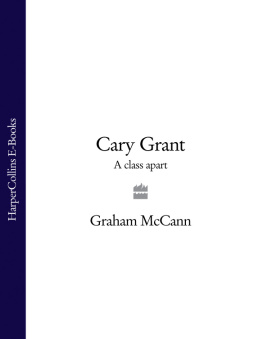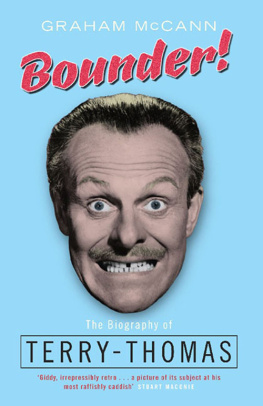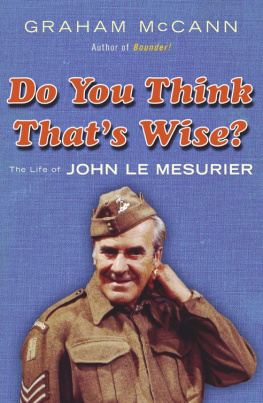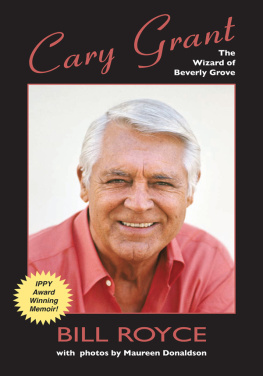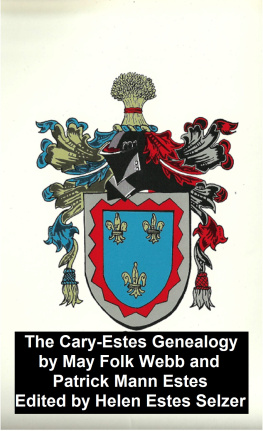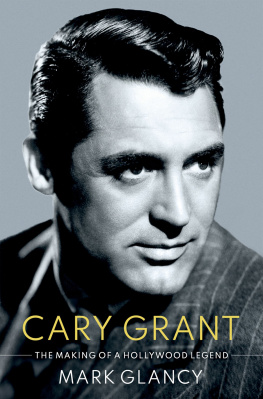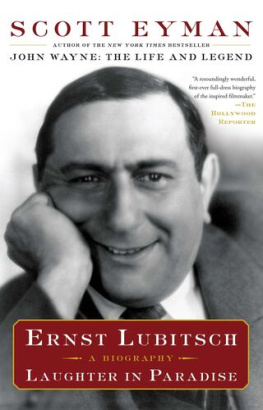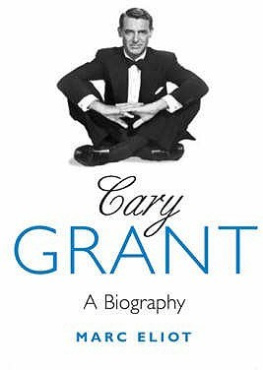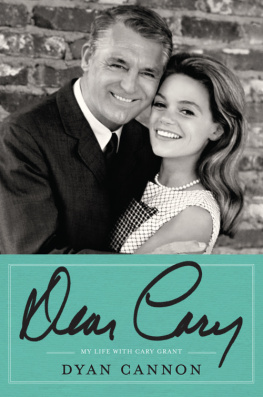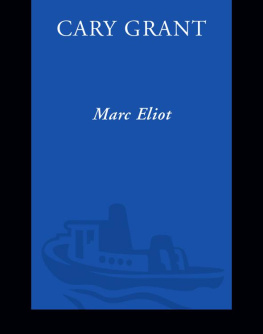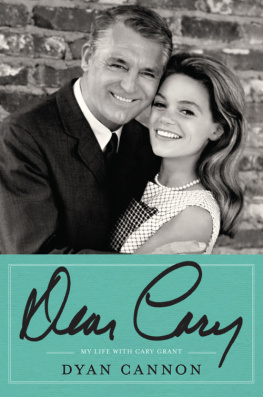
For Silvana
and in memory of my dear grandparents,
Frank and Florence Geary
A mask tells us more than a face.
OSCAR WILDE
Some might say they dont believe in heaven
Go and tell it to the man who lives in hell.
NOEL GALLAGHER
Cary Grant was an excellent idea. He did not exist, so someone had to invent him. Someone called Archie Leach invented him. Archie Leach did not know who he was, but he knew what he liked. What he liked was what he came to think of as Cary Grant. He discovered that it was an extraordinarily popular conception. Everyone really liked the idea of Cary Grant. Archie Leach liked it so much that he devoted the rest of his life to its refinement.
It is easy to see why. Cary Grant was the man that most men dreamed of being, an exceptional man, the man from dream city.
There was nothing wrong with Cary Grant. His colleagues admired him. Carys the only actor I ever loved in my whole life, said Alfred Hitchcock.
There was nothing wrong with Cary Grant. Movie audiences loved to watch him. In the era when movies were made with and around stars, the initial attraction being the name above the title, no fewer than twenty-eight Cary Grant movies more than a third of all those he made played at New Yorks Radio City Music Hall (the largest, most important and prestigious movie theatre at that time in the United States) for a total of 113 weeks a long-standing record.
There was nothing wrong with Cary Grant. Critics warmed to him. We smile when we see him, wrote Pauline Kael, we laugh before he does anything; it makes us happy just to look at him. and in part because of the extraordinary richness of the results of this commitment, an art mature and elaborate enough to embrace the ambiguities of a self shown in close-up.
There was nothing wrong with Cary Grant. There was much, however, that was extraordinary about him. That accent: neither West Country nor West Coast, neither English nor American, neither common nor cultured, strangely familiar yet intriguingly exotic (as someone in Some Like It Hot exclaims: Nobody talks like that!). That expression: capable of blending light and dark inside a single look, hinting at much more than it holds up for show. That walk: confident, athletic and slightly rubber-legged, fit for slapstick as well as for sophistication. He was, in an unshowy way, unusually versatile: he could play submissive, naive, child-like characters (such as in Bringing Up Baby) or worldly-wise charmers (as in Suspicion) or world-weary cynics (as in Notorious). John F. Kennedy thought that Grant would Grants exceptionally broad appeal was in part to do with his bright roundedness, the promise of completion, showing the coarse how to have class and the over-refined how to have the common touch, teaching the unruly how to behave and the repressed how to have fun. What was so remarkable was how Cary Grant himself seemed to be so conspicuously complete. No one else was quite like him. There was something odd, something peculiar even, about his perfection.
Everybody wants to be Cary Grant, said Cary Grant. Even I want to be Cary Grant. It is really not so strange that even Cary Grant could not always succeed in being Cary Grant. It is not as if Archie Leach had always found it easy to be Archie Leach. The difference is that everyone knows who Cary Grant is supposed to be, everyone knows the rules, while not even Archie Leach was ever very sure of who Archie Leach was supposed to be.
Everybody knows Cary Grant. What everybody knows about Cary Grant, however, is largely what he wanted us to know. Leslie Caron, one of his last co-stars, recalled: He would say, Let the public and the press know nothing but your public self. A star is best left mysterious. Just show your work on film and let the publicity people do the rest.
Cary Grant was an excellent idea. The last person who wanted to deconstruct that idea was Cary Grant:
Who tells the truth about themselves anyway? A memoir implies selectiveness, writing about just what you want to write about, and nothing else. To write an autobiography, youve got to expose other people. I hope to get out of this world as gracefully as possible without embarrassing anyone.
It was typically Cary Grant: polite, urbane, decent and discreet and very much in control. He looked on with wry amusement as the old tales were retold and the new myths manufactured: he ignored all the parodies and pretenders, all the old quotations and well-worn misconceptions, all the Judy, Judy, Judys and the How old Cary Grants. He did not rise to the bait. He refused to involve himself in the investigations. He kept his self for himself. Go ahead, I give you permission to misquote me, he told his uninvited chroniclers. I improve in misquotation.
Cary Grant, in more than one sense, was a class apart. Socially, he was a glorious enigma, eluding every pat classification. Artistically, he was, in his own particular field, without peers. In a leading article in the Washington Post shortly after his death, it was said that the name Cary Grant, in the absence of anyone remotely like him on the screen, continued to be a synonym
Everybody wanted to be Cary Grant. Everyone else, before and since, failed. It took someone special to succeed. It took Archie Leach.
It is not dreams of liberated grandchildren which stir men and
women to revolt, but memories of enslaved ancestors.
WALTER BENJAMIN
Peace. Thats what Im looking for. I want peace. With
happy hearts and straight bones without dirt and distress.
Surprises you, dont it? Peace thats what us millions want,
without having to snatch it from the smaller dogs. Peace to
be not a hound and not a hare. But peace with pride to
have a decent human life, with all the trimmings.
NONE BUT THE LONELY HEART
CHAPTER I
Archie Leach
Dont I sound a bounder!
CARY GRANT
Take it from me: it dont do to step out of your class.
JIMMY MONKLEY
Cary Grant was a working-class invention. His romantic elegance, as Pauline Kael remarked, was wrapped around the resilient, tough core of a mutt.
The transformation of Archie Leach into Cary Grant was a quality commented on by another character in the novel:
If personality is an unbroken series of successful gestures, then there was something gorgeous about him, some heightened sensitivity to the promises of life, as if he were related to one of those intricate machines that register earthquakes ten thousand miles away.
The two men differed, however, in their relationship with their old identities; Gatsby was a tense denial of Gatz whereas Grant was a warm affirmation of Leach. With Gatsby, all the careful gestures the pink suits, the silver shirts, the gold ties, the Rolls-Royce swollen with chrome, the pretensions to an Oxford education, the clipped speech, the old sports, the formal intensity of manner helped to conceal the unwelcome persistence of the insecure roughneck, James Gatz. With Grant, however, the accent, the mannerisms, the values, the sense of humour, continued to underline the strangeness of his cultivation. To Gatsby, any memory of Gatz, any recognition of the prosaic facts of his existence, represented a threat to his new identity. To Grant, on the contrary, Archie Leach remained with him, an intrinsic part of his life and character, an affectionate point of reference in his movies and his interviews: Archie Leach was no threat to his or others sense of himself. Archie Leach was the measure of his success and, in a profound sense, a reason for it.

